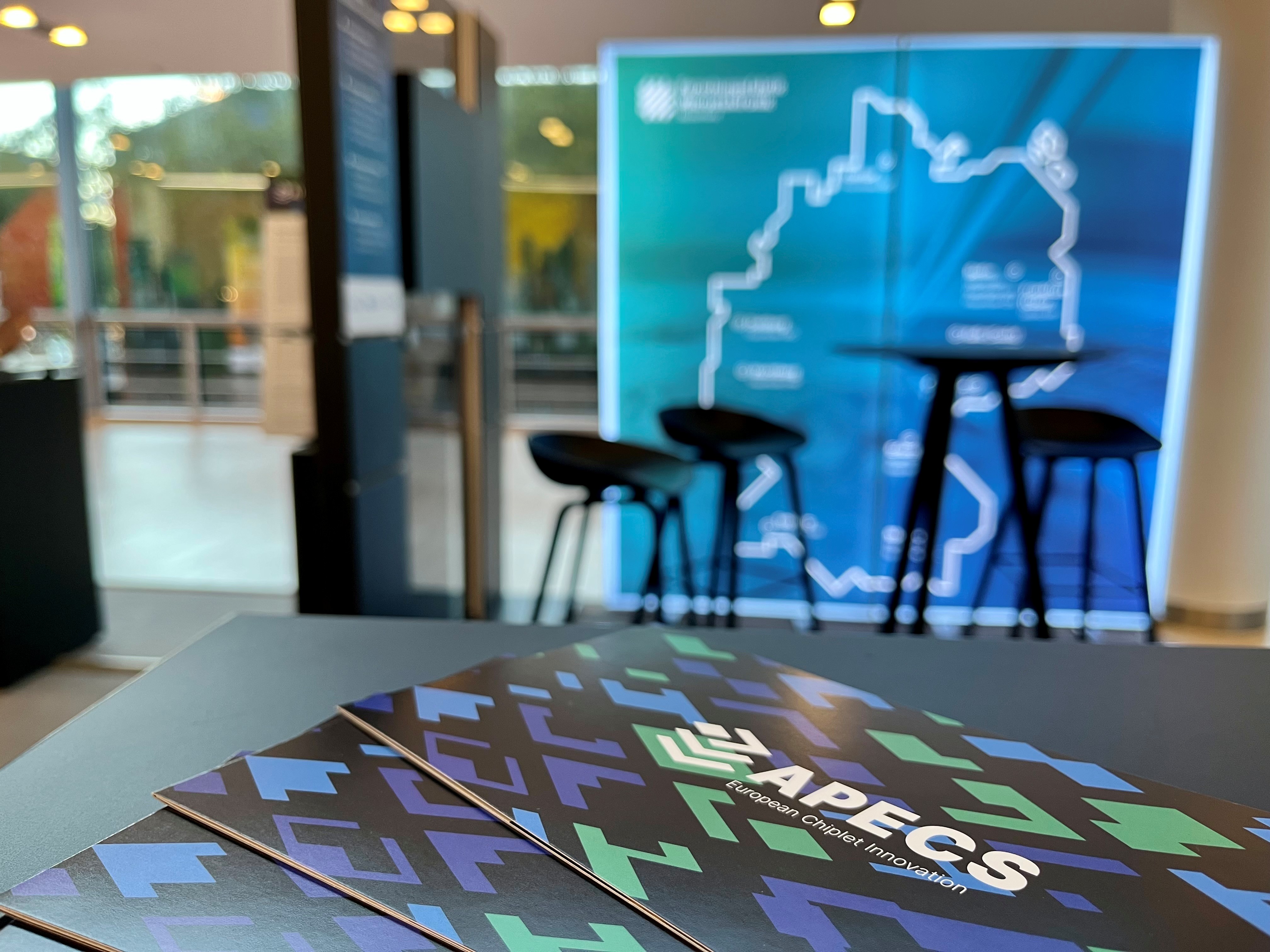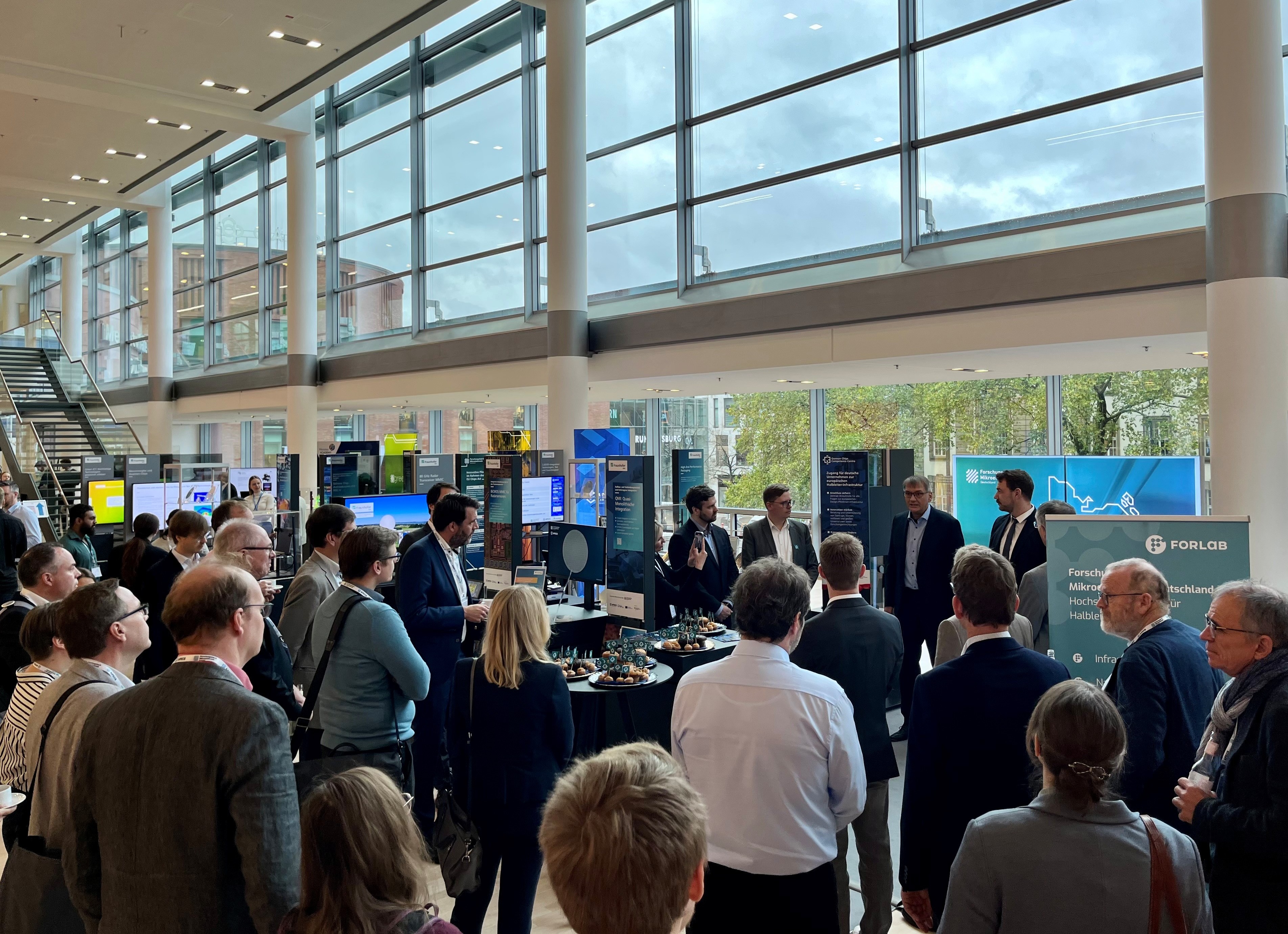FMD at the MST Congress 2025 | Reading timet 3 Min.
FMD demonstrates German research strength at the MicroSystem Technology Congress 2025
Duisburg, October 30 2025 – Under the congress motto “Change through Progress,” the German Microelectronics Research Factory (FMD) presented itself at the 2025 MicroSystem Technology Congress in Duisburg from October 27 to 29 with a large joint booth and a diverse program of contributions. The participating Fraunhofer and Leibniz Institutes presented their latest research results addressing key topics such as sustainable electronics, quantum and neuromorphic computing, advanced packaging, and heterointegration. In addition to an exciting special session on the APECS pilot line, the grand opening of the “German Chips Competence Center” was a particular highlight.


How can microelectronics and microsystems technology contribute to strengthening the European semiconductor market? This topic was the focus of the MicroSystems Technology (MST) Congress, which highlighted the key role played by cross-location and cross-technology research and development in particular.
One-stop shop for microelectronic research and development
The FMD was represented at a joint booth with eleven cooperating institutes from all over Germany (Fraunhofer AISEC, Fraunhofer EMFT, Fraunhofer ENAS, Fraunhofer FHR, Fraunhofer IISB, Fraunhofer IMWS, Fraunhofer IPMS, Fraunhofer IMS, Fraunhofer IZM, Leibniz FBH, Leibniz IHP), and impressively demonstrated how cooperation across institutional boundaries can lead to new solutions.
Technology exhibits and demonstrators from the large-scale inter-institutional projects Green ICT @ FMD, FMD-QNC, and the APECS pilot line were presented. The R&D offerings of the Fraunhofer and Leibniz institutes ranged from quasi-monolithic integration (QMI), a novel superconducting cabling system for quantum computers, to a hermetically sealed quantum package with thin glass and a hetero-integrated power amplifier for the D-band, to a scanning LiDAR system and a new generation of microdisplays for augmented reality and virtual reality applications.
Through its diverse participation in the congress program—including technical presentations, panel discussions, and the APECS special session—the FMD made it clear that Europe's technological independence arises where the nationally distributed application-oriented research landscape presents a united front.
APECS special session provided insight into pilot line construction
A highlight of the FMD's presence was the presentation of the APECS pilot line (Advanced Packaging and Heterogeneous Integration for Electronic Components and Systems), which will be launched at the end of 2024. During the special session “European Chiplet Innovation,” moderated by Dr. Michael Töpper (FMD office), FMD experts conveyed the significance of this European pilot line and highlighted topics such as the integration of chiplets, system-technology co-optimization, and testing and reliability aspects.
Implemented as part of the EU Chips Act, the APECS pilot line aims to link cutting-edge microelectronics technologies with the specific requirements of German and European industry. It creates the basis for a low-threshold, easily scalable transfer of newly developed innovations, thereby strengthening Europe's competitiveness in the field of advanced packaging.
In the course of setting up the pilot line, the Research Factory Microelectronics Germany itself has also grown. The Fraunhofer Institute for Applied and Integrated Security AISEC and the Fraunhofer Institute for Microstructure of Materials and Systems IMWS strengthen the FMD with their respective expertise. While Fraunhofer AISEC contributes comprehensive expertise in the field of hardware security and trustworthy electronics, Fraunhofer IMWS complements the FMD with its know-how in the field of new materials and analytics in microelectronics and assembly and interconnection technology. Both Fraunhofer Institutes are thus making significant contributions to the successful establishment of the APECS pilot line.
German interface to European design and manufacturing pilot lines: G3C
On October 28, 2025, the “German Chips Competence Centre” (G3C) was also officially opened during the congress. In their welcoming speeches, Dr. Oliver Höing (Federal Ministry of Research, Technology, and Space) and Dr. Stephan Guttowski (FMD office) emphasized the importance and necessity of cross-location and cross-organizational contacts in the field of key microelectronics technology – such as the FMD and the G3C.
The center will be established in the coming years by the FMD, which, as an established central point of contact for microelectronic research and development, already provides a solid foundation for the Chips Competence Center.
G3C project manager Alexander Stanitzki emphasized the importance of such a national center and explained that the G3C creates a bridge to the European chip infrastructure for German innovation drivers, both in the field of chip design and manufacturing. For SMEs and start-ups, this means easier prototyping, faster scaling from the lab to production samples, and earlier market entry – and thus better chances of competing internationally.
Dr. Björn Lekitsch (co-founder and CTO of neQxt) confirmed this from a business perspective and emphasized the added value that results in particular from the bundled expertise and more intensive networking with important technology partners and key players in the German and European semiconductor market.
About the Research Factory Microelectronics Germany (FMD)
The FMD, a collaboration between 13 Fraunhofer Institutes and the Leibniz Institutes FBH and IHP, is the central point of contact for all questions relating to micro- and nanoelectronic research and development in Germany and Europe. As a one-stop shop, the FMD combines the scientifically excellent technologies and system solutions of its cooperating research institutes into a customized overall offering.
Under the virtual umbrella of FMD, one of the largest alliances of its kind was formed in 2017, now with more than 5,400 employees and a unique diversity of expertise and infrastructure. For more information, visit www.forschungsfabrik-mikroelektronik.de.